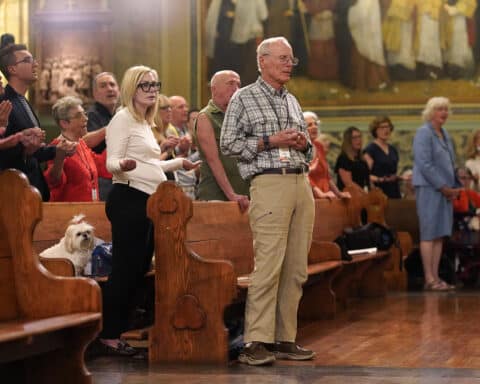It happens all the time. You’re out at a social gathering and someone knows you are Catholic. Their curiosity, without fail, prompts them to ask questions that always have nagged at them. Why can’t priests get married, or why doesn’t the Church allow women to be priests? You’re in a bind. You know the Church is clear on these issues, but to be honest, you’re not exactly sure how to explain the answer.
To be sure, there are various ways of answering — but before it is attempted, you must be well-formed yourself. If we want to bring others closer to the Faith, we must respond with clarity and love, and avoid cynicism. We must also remember to approach these questions in the interest of seeking truth. Ours is not a religion of “anything goes.” Everything in our faith is intelligible to one degree or another, and we must be cautious not to cop out and give up trying. To steal a line from the ’90s TV show The X-Files, the Church knows and believes “the truth is out there.” We know this because Jesus identified himself as “the way, the truth and the life” (Jn 14:6).
While the truth might be offensive to some, the manner in which we explain it doesn’t have to be. It’s important to converse about the topic with nuance and sensitivity. Charity is key. Also, it always is best to try to answer such questions in the context of the bigger picture, as we have attempted to do in the pages following. Citing the Catechism of the Catholic Church or the Bible usually isn’t sufficient. People want to know why.
What follows is an attempt to broaden one’s understanding of certain issues brought up frequently in today’s culture. Moreover, it is an attempt to answer “tricky” questions in a manner that is both pastoral and clear. As such, these answers serve as models for the discussion of similar topics that frequently become divisive today, and they attempt to offer a solution to help bridge the gap in our polarized society.
Priestly Celibacy
Question: Why can’t a priest get married?
Answer: A distinction must be made from the outset: Some Catholic priests can get married and some can’t. This distinction is possible because there is nothing in the deposit of faith that prohibits priests from being married. There is a long-standing practice, though, to require celibacy of Latin (or Roman) rite priests. In the Eastern rites, celibacy generally is not required — although it is required for bishops. Additionally, you will find married Catholic priests who come, for the most part, from one of the following scenarios: former Protestant ministers who have been ordained as priests under provisions approved by Pope St. John Paul II, former Anglican priests who have been received into the Catholic Church and been ordained Catholic priests after the establishment of Anglican ordinariates by Pope Emeritus Benedict XVI, or Orthodox priests who are received into the Catholic Church.
But, yes, the majority of Roman-rite Catholic priests are celibate, and the Latin Church does not see this as an imposition. Rather, it sees celibacy as a sign that the priest’s consecration to the Lord is with an undivided heart, where “they give themselves entirely to God and to men.” “Celibacy is a sign of this new life to the service of which the Church’s minister is consecrated; accepted with a joyous heart, celibacy radiantly proclaims the reign of God” (Catechism of the Catholic Church, No. 1579).
Furthermore, any Catholic priest, if already ordained a priest, cannot subsequently marry. That is because marriage after ordination is not possible ordinarily, without permission of the Holy See. This would also apply in a situation if a wife died and a priest sought to remarry, for instance.
Same-Sex Marriage
Question: A friend of mine is getting married, but it’s a wedding between a man and another man. I don’t want to hurt his feelings, but I’m not sure it’s right for me to go. What should I do?
Answer: The old saying “You’ve got to stand for something or you’ll fall for anything” comes to mind here. Oftentimes we might think that it is OK to attend an event like the one mentioned above because it is “a one-time only thing” or we “don’t believe in what they are trying to do.” Or we act solely under the banner of not wanting to hurt anyone’s feelings. We also might think to ourselves: “God is forgiving and understanding,” so does it really matter? Yes, it does.
The Catholic Church recognizes marriage as existing only between a man and a woman, and to support any other simulation of marriage, when knowing what marriage is, is problematic. It would be a denial of what we believe in as Catholics: that, through nature and divine revelation, God established the marriage institution from the foundation of the world. In addition to persons joining in a so-called same-sex marriage, other problematic scenarios include support of a marriage attempted between persons divorced without an annulment. Presence at such events, even if not in agreement with what is taking place, is ultimately, even if not intended, a complicit endorsement of the act contrary to God’s plan that is taking place. The whole of Christ’s life is defined by obedience to the Father’s will, and that should define the Christian’s life. Fundamentally, then, it seems the question really is: Is this “marriage” something God intends or wants? Christians are called to cooperate with God’s will, not act against it.
Of course, writing about executing such a decision and actually doing it are two very different things. Each situation has its own set of criteria and decisions about how to handle them must be made carefully, with a fully formed conscience. Decisions like this aren’t made in a vacuum, but the final decision of whether or not to attend must be made with adherence to truth and obedience to God’s will. Situations like the one in the question are real, they affect real people’s lives — and they’re no doubt agonizing. The many facts that must be weighed by a well-formed conscience are deliberated upon with the assistance of prayer and preferably with the guidance of a pastor. If we decide not to attend such an event, we should not get preachy and should not make a scene. We should be as kind, loving and considerate as possible, and there must be a primacy of charity in how we go about communicating our decision. Perhaps we could consider writing a letter to the person(s) involved about why we have decided to not attend the event. Perhaps one could take them out to a casual dinner before or after the event. And we should always, always pray for all involved, that their hearts might be opened to the truth of Christ and his Church.
Reception of the Eucharist
Question: At Easter my whole family gets together for a meal and Mass. I know most of my extended family doesn’t go to Mass regularly but they still receive Communion. What should I say to them about it?
Answer: God is the giver of all gifts. The sacraments are chief among those gifts. Gifts are gifts because they are not given out of justice. Rather, they are given by the giver freely, out of love and must be received in love. As such, it might be helpful to explain reception of holy Communion as a gift and not a right.
The Church teaches that we must receive holy Communion only if we are in the state of grace. Why? Because in order to receive that gift in love, we want to make sure we are as pure as possible so that we can receive that gift lovingly and worthily.
We are not left to our own devices, though, to bring about the state of grace within our souls. And thankfully so! Christ enables the Church, through the Sacrament of Penance, to forgive the sins of those of us who confess them freely, with true sorrow and contrition and resolution to sin no more.
The reality is that missing Mass is a sin that destroys our relationship with God. There is not enough space here to answer the reasons why that is the case, but we want to gently encourage our loved ones first and foremost to make weekly Mass attendance a priority in their lives.
There is no need to be antagonistic. Broach the subject lovingly, perhaps in a way that springs forth from your own joy that comes from attending liturgy and receiving the Eucharist. Let them know what a difference frequent reception of the sacraments has made in your life. Personal witness and personal joy are attractive.
In Vitro Fertilization
Question: I know the Church teaches that in vitro fertilization is wrong, but my friends are so desperate for a child. What does it really matter?
Answer: In the Catholic view, God designed the world with order and purpose. We are creatures who always are battling the urge of Adam and Eve that has tainted humanity: to appropriate God’s role in creation.
Theologically speaking, the Church always will choose first to support what is found in nature. Secondarily, the Church will support scientific advancements so long as they support what is already found in nature.
Nature gives the plainest evidence of God’s plan for the universe. According to it, then, children only come about in one way — not grown on trees or in gardens, but through sexual procreation of a male and a female. Male and female are designed to come together — as biology and anatomy attest — in the sexual act. Furthermore, the unity that the sexual act expresses is indicative of the unity of the male and female brought about in their marriage. The two become united in marriage, so much so through their bodily unity they open themselves to their co-creative power to produce a new body — truly a “one-flesh” union.
The Church understands that children are meant to be raised in a family — with a mother and a father. We find that in nature, and we learn more about that in divine revelation. In fact, children are a product of marriage, and there is no other reason they should come about.
Of course children do naturally come about in other situations, however, and many of these are far from ideal. They could include a man and a woman afraid to commit to each other in marriage, or it could be through the worst situations possible, such as rape or incest. This does not diminish the dignity of the person who was brought into existence under such situations. The trump card in these unfortunate scenarios is, of course, that all human life is sacred and has infinite value because it is crafted after the image and likeness of God.
Because children are designed by God to be the fruit of a one-flesh union of male and female, the Church opposes any other form of procreation. This would include means not yet attainable, such as human cloning, or means in popular use today, such as in vitro fertilization.
In vitro disrupts the order that God intended for his creation. In vitro also uses science to bring about new life outside of the womb when it joins egg and sperm in a petri dish to create embyos. Often, some of these embryos then are implanted within the womb while others are discarded. Because the Church believes life begins at conception, when embryoes are discarded, so is human life, which obviously is immoral.
So is the Church telling couples who may be struggling with infertility that they can’t have children? Absolutely not. The Church recognizes that there are infertile couples who desire to live their vocation as family with children in their home. At the same time, the Church recognizes that there are many children in the world who are unwanted and not afforded those rights due them. Adoption is the recommended path in situations like this. And adoption is a very biblical concept, rich in meaning and no less rich in love. There is also spiritual parenthood, which is no less important and real.
It is important to note that the Church is not opposed to innovative methods to promote fertility — such as NaPro Technology — so long as conception occurs naturally.
The bottom line is that, similar to the sacraments, children are a gift, not a right. The product of a one-flesh union of a male and female, children are not commodities. They aren’t pets. They have immortal souls, are of infinite dignity made in God’s image and are to be provided for as such.
Women Priests
Question: Why can’t women be priests?
Answer: There isn’t enough space here to do a full examination of this important issue, but to best understand the Church’s teaching on this issue, one must consider both Tradition and the iconic nature of the priesthood. The years following the Second Vatican Council and the sexual revolution in the mid- to late-20th century presented a period of confusion regarding what seemed to be an open question of exploring the possibility of ordaining women to the priesthood. This practice was found acceptable by some Christian communities — for example, the Anglican Communion — but unacceptable by other churches — for example, the Orthodox. (It is noteworthy that much of what the Catholic Church teaches on the reservation of priesthood to men alone also is embraced by the Orthodox churches.)
To help put this matter to rest, the Catholic Church in 1976 reiterated that the priesthood should be reserved for men alone when the Congregation for the Doctrine of the Faith, at the direction of Pope Blessed Paul VI, issued the declaration Inter Insigniores. This primarily is because of Christ’s attitude regarding ordained ministry, found in both his example and that of Christian tradition. Although women were actively involved in the life of Christ during his ministry, Jesus did not appoint women to the apostolic office. “Jesus Christ did not call any women to become part of the Twelve” (No. 2). This is not to say that Jesus was discriminatory toward women, however. As Inter Insigniores points out, “His attitude toward women was quite different from that of his milieu, and he deliberately and courageously broke with it” (No. 2).
Jesus’ break with cultural treatment of women is seen in multiple places throughout the Gospels. It is also seen clearly in the Easter story, in which women were “the first to have the privilege of seeing the Risen Lord,” yet were not “the official witnesses to the Resurrection” (Inter Insigniores, No. 2). Following this example, the Church carries on Christ’s will in regard to sacramental orders. “By calling only men to the priestly Order … the Church intends to remain faithful to the type of ordained ministry willed by the Lord Jesus Christ and carefully maintained by the Apostles” (No. 1). This teaching was reiterated by Pope St. John Paul II in his 1994 apostolic letter Ordinatio Sacerdotalis, in which he sought to dispel any lingering doubts regarding the Catholic Church’s teaching on women’s ordination. And so, with great solemnity, he provided unambiguous teaching on the issue: “Wherefore, in order that all doubt may be removed regarding a matter of great importance, a matter which pertains to the Church’s divine constitution itself, in virtue of my ministry of confirming the brethren (see Lk 22:32) I declare that the Church has no authority whatsoever to confer priestly ordination on women and that this judgment is to be definitively held by all the Church’s faithful” (No. 4).
It is important to note that this statement by St. John Paul II fulfills the conditions for an infallible statement, as taught at the First Vatican Council, and clearly is phrased in such a manner. By virtue of his ministry as universal shepherd and teacher ex cathedra (with the full authority of office), the pope has the power to define something concerning faith and morals, which are to be held by the universal Church, as “infallible.”
It’s important to note that all of this, though, is a matter of function, not a question of dignity and holiness. In God’s designs, masculinity and femininity both matter. In this vein, the Church’s tradition appropriately and concisely expresses a nuptial imagery of the Church: as men fittingly represent Christ, women suitably represent the Church. The Second Vatican Council reiterated the importance of the participation of women in the life of the Church — a topic covered more in-depth in a variety of Pope St. John Paul II’s writings that underscored the dignity and vocation of women. That dignity and vocation is seen in the countless women of every time and place who — in fidelity to the Gospel — have attained the heights of holiness.
Assisted Suicide
Question: I recently heard a talk radio host advocating for physician-assisted suicide. She said it was a merciful way to end life. Why does the Church not agree?
Answer: There are two major themes at play when it comes to the conversation on euthanasia: human dignity and suffering.
First, Scripture tells us that out of all God made, human beings are the pinnacle, because we are described as having been made in his image and likeness. Human beings have an inviolable dignity. Our very lives in fact are a gift from God, and each of us is called to live a life of gratitude. We give God thanks for our lives, first of all, by respecting our own and those of others. The Fifth Commandment is not just a prohibition to killing, but rather its first order of business really is to promote a “yes” to life. By taking our own life or the lives of others we are destroying our relationship with the God who gave us life.
Second, why do most people want to seek physician-assisted suicide in the first place? Most of the time, this option is sought after to avoid suffering. On the surface, this is understandable. However, a Christian cannot understand suffering outside of the context of the cross. In his passion, Jesus endured the unfathomable depths of human suffering. Mocked, reviled, abused, he was executed by the barbarity of crucifixion. In the end, though, we see that his great suffering had a purpose: It brought about our redemption and opened up for us the path to salvation. As Jesus put it before he died, it was the greatest act of love. In the saga of the cross, suffering and love are inextricably linked. Jesus himself gave into questioning it the night before he died, asking the Father, “Can this cup be taken from me?” But ultimately, for the sake of humanity, he submited to his Father’s will.
| Want to know more? |
|---|
|
Beginning this fall, Our Sunday Visitor’s The Catholic Answer will offer a weekly newsletter filled with catechetical and apologetics content that will help you better understand and defend the Faith. Don’t miss out on this great opportunity to have faithful, relevant content delivered directly to your inbox. Go here to sign up: https://bit.ly/2boTrSD
Do you have a question about the Faith? Email tcanswer@osv.com to ask the editor!
|
Suffering is not a good, objectively. As it is a product of original sin, suffering was never part of God’s plan for humanity. But as Pope St. John Paul II said in his 1984 encyclical on the Christian meaning of suffering, Salvifici Doloris, “In the Christian view, the reality of suffering is explained through evil, which always, in some way, refers to a good” (No. 7).
Those who desire and promote euthanasia choose to believe they are the masters of their existence. They believe they are bringing mercy by bringing death. But the God of Jesus Christ — who is mercy and love itself — did not deign to remove suffering even for his Son. Rather, God used that suffering to bring about the greatest of goods — and give us a living example after which to pattern our lives. God’s ways are better than any of our imaginings.
Pope St. John Paul II cuts to the heart of the theological understanding of suffering in his encyclical when he says, “The Redeemer suffered in place of man and for man. Every man has his own share in the redemption. Each one is also called to share in that suffering through which the Redemption was accomplished” (No. 19).
While on the night before he died, Christ questioned the need of the suffering he was about to endure, it must also be recognized that he consented to it. Obediently, he trusted in God’s plan, knowing, as St. Paul put it, that “all things work for the good for those who love God.”
Though it’s not easy, our suffering enables us to discover our true identity — an identity in Christ, the Suffering Servant.
Michael R. Heinlein is editor of The Catholic Answer magazine. Follow him on Twitter @HeinleinMichael.





